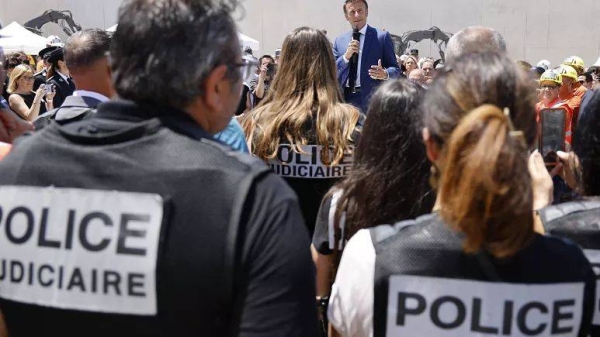
In the 13th arrondissement of Marseille, one of the quartiers nord (northern neighbourhoods) of the city, a professor walks toward the high school where she runs a geography program. She pauses briefly, pointing down the road.
“When Macron visited, that’s where he went,” she said, looking at another school nearby. She rolled her eyes and shook her head, looking around at the students. “They know it’s just politics, everyone knows.”
The quartiers nord of Marseille have been a point of political discourse for decades.
In recent weeks, gang violence has been flaring up around France. On September 29, two men were killed in a drive-by shooting in front of a pharmacy in the 4th arrondissement. In early September, a 24-year old student was studying for an exam in her bedroom when a stray bullet killed her. In late August, a ten-year-old boy was killed in a drug-related shooting in Nîmes.
Macron vows the state will be back in the quartiers nord of Marseille. But what this statement really implies is that it isn’t there now, experts argue.
One class-action lawsuit is working on bringing this to court.
Mathieu Croizet is the lawyer in charge of the case. He was talking with Amine Kessaci, the head of the non-profit Conscience, an organization that supports young people in the quartiers nord and around France. Kessaci asked if there could be legal grounds to hold the state more accountable for the violence.
“I remembered that there was a case ten years ago in Réunion (a French island in the Indian Ocean) where the French state didn’t do much to prevent shark attacks, and there was a lawsuit in a special proceeding called référé liberté, which is a type of proceeding that requires two conditions,” Croizet said. “It has to be an emergency, and there has to be a violation of human rights... based on that, we decided to launch the first lawsuit.”
To go to court, the case has to pass through a first ‘filter,’ where a judge establishes that these two conditions are present. The first two attempts didn’t pass. They’re now working on the third.
The fundamental argument in the case is that the state is violating the right to security.
“That’s straightforward, but it’s in the French internal security code... it says that security is a human right,” Croizet said. “Without security, you cannot use any of the rights as a human being... for example, the right to privacy in your home, the right to come and go, the right to move around, the right to a peaceful life—you can’t.”
The case of Socayna, the student who was shot in her bedroom, exemplifies this.
There may also be an infringement on Article 2 of the European Convention of Human Rights: the right to live, Croizet argues.
“Article 2 says you have the right to live, which implies you have the right not to die,” he said. “The right to live is also living without threats... we show that the state has not done anything to prevent the threat, and has infringed on the right to live peacefully.”
Hassen Hammou, the founder of the association Trop Jeune Pour Mourir (Too Young to Die)—a group working to end violence and build solutions for the quartiers nord in Marseille – says that the group never heard back from state serviceswhen it reached out for additional resources and support.
“It’s not that I think the state can’t help... it’s the opposite... I think that the state could help, but they don’t,” he said. “The President of the Republic came to Marseille, in the neighbourhood, and [spoke]... but discourse will never replace actions.
Another argument outlines the issue of “violence pollution,” which infringes on the right to live a healthy life in a healthy environment as written in France’s Constitutional Environmental Charter.
“I think that we can conclude that people living in the projects have to undergo another kind of pollution, which is pollution from violence,” Croizet said. “They’re clearly not living a healthy life in a healthy environment, because violence can induce a ton of other medical problems... and in that environment you can have a higher chance of getting cancer, or heart disease because you’re living in a stressful environment. Living in an environment that is not healthy will have a ton of repercussions down the line.”
Although it might not be argued in court, Croizet also cited an infringement on the principle of equality, one of the pillars of France’s national motto liberté, égalité, fraternité (liberty, equality, fraternity).
“For the last 30 years, politicians have been saying that the state has to be back in the projects, which implies that the state is not there,” he said. “When you say that the state has abandoned the people living in the projects, it means that the people living in the projects are not being treated equally, because the state is not around.”
In France, it’s illegal to collect data on race, religion and ethnic backgrounds. But there are statistics based on income.
“The people in the projects have low income... they are basically discriminated against,” Croizet said. “The state has abandoned them, this is objective, it’s an objective fact.”
Eric Marlière, a professor of sociology at the Université de Lille, doesn’t agree that blame can be put squarely on the state.
“Is it the failure of the French state specifically? No,” he said.
But Marlière outlines the primary causes—although multifaceted and varied—as being economic, social and political, and argues that this population is largely ignored by politicians.
“The suffering, the pain, the wants, the needs of this population are very rarely considered by politicians,” he said. “All of this amounts into a strong feeling of injustice.” — Euronews












